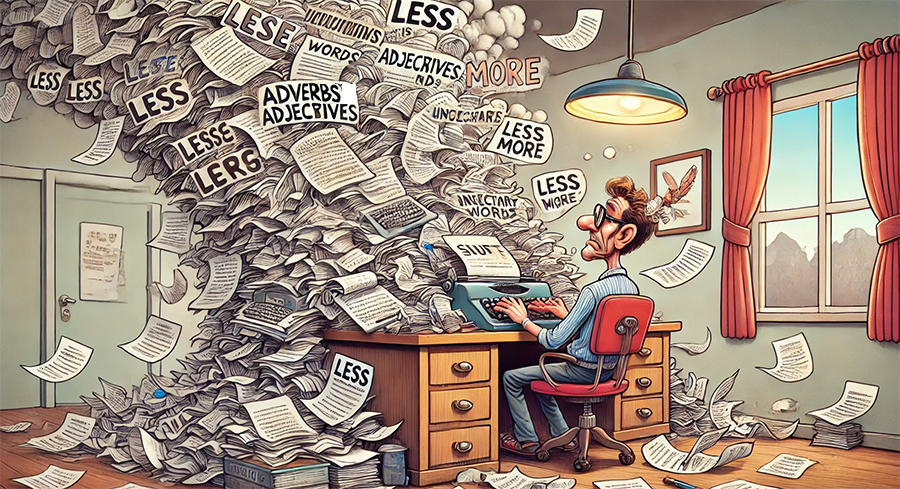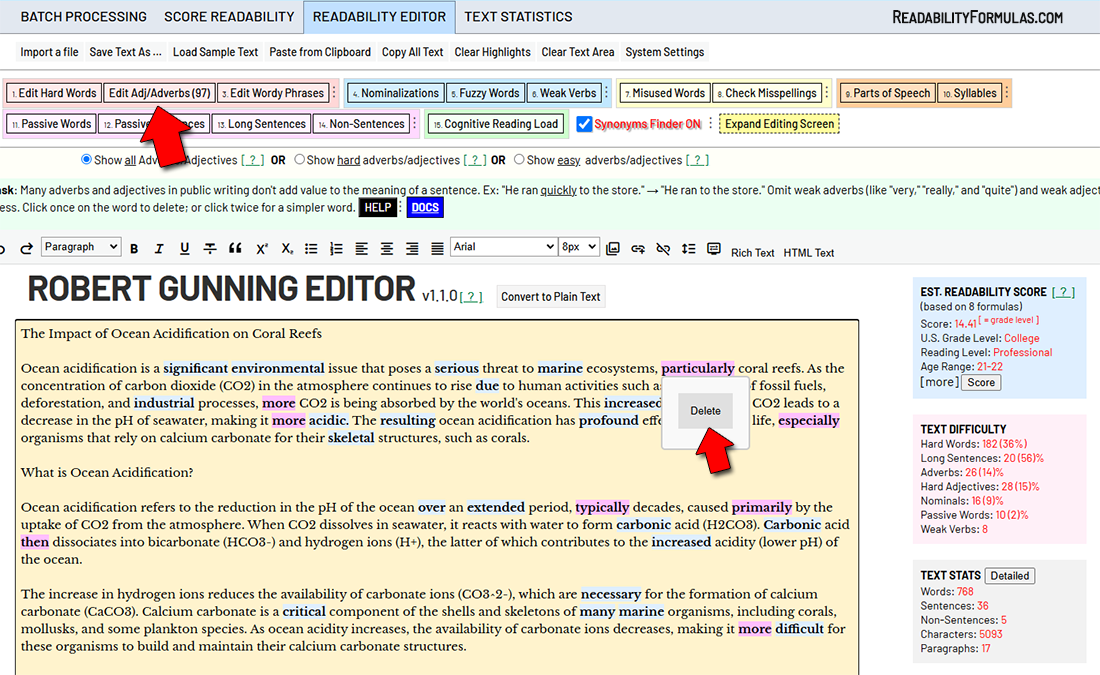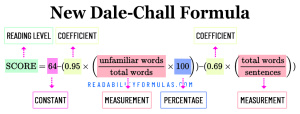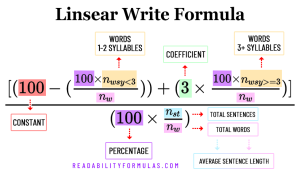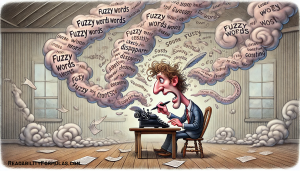InnoWave Technologies, a small startup in SoHo, was ready to launch its first product—a sleek, innovative gadget that was set to revolutionize the industry.
The air in their office crackled with excitement (and maybe a little too much caffeine) as the team huddled together to craft the perfect press release. Determined to make a splash, they threw in every fancy adjective and adverb that came to mind, just to be sure the world knew how groundbreaking their invention was.
The Dynamic Duo of Descriptive Language
Adverbs and adjectives are like the salt and pepper of sentences. They spice things up, make your writing tastier, and sometimes, if you’re not careful, leave you with a dish that’s a little too seasoned.
Adjectives: The Fashionistas of Language
Adjectives are trendy words that love to accessorize nouns (you know, those people, places, things, or ideas we’re always talking about). Think of adjectives as the stylish friend who always knows the right outfit to wear.
- What kind? (Is it a red apple or a blue one? You can’t just bite into any old apple!)
- Which one? (Is it this book or that book? One might be a page-turner, the other a snooze-fest.)
- How many? (Are we talking about three cats or fifty? Because that’s the difference between a cute YouTube video and an episode of Hoarders.)
In the sentence, “She has a small dog,” “small” is an adjective. It tells us that the dog isn’t a big, scary, eat-your-mailman kind of dog—nope, it’s the cute, fits-in-your-purse variety.
Adverbs: The Jack-of-All-Trades
Adverbs are like that one friend who can do everything. They modify verbs (the action heroes of sentences), adjectives (the fashionistas we just talked about), and even other adverbs (because why not?). If adjectives are the ones picking out outfits, adverbs are the ones telling you how to strut your stuff down the runway.
- How? (Does she run quickly like the Flash, or slowly like a sloth on vacation?)
- When? (Did he arrive yesterday or is he showing up fashionably late?)
- Where? (Did you look everywhere for your keys, or just in the fridge because, you know, sometimes they end up there?)
- To what extent? (Are you very happy or just kind of happy? Because that will determine if you’re smiling or doing cartwheels.)
For example, in “He runs quickly,” “quickly” is an adverb. It’s like saying, “He runs, but not like your Uncle Bob during the annual family 5K—more like a cheetah chasing its lunch.”
Adjectives vs. Adverbs: The Showdown
- Adjectives describe nouns: “She wore a beautiful dress.” (And you better believe it was fabulous.)
- Adverbs describe verbs: “She sings beautifully.” (Think Taylor Swift, not your neighbor at karaoke night.)
Remember:
- Adjectives usually hang out in front of the noun they’re describing. They also pop up after linking verbs like “is” or “seems.”
- Adverbs are the free spirits of the grammar world. You can find them all over a sentence, often right after the verb or at the end, telling you how, when, or where the action is happening.
Examples in Action
- Adjective: “The happy child played with his toys.” (Happy describes the noun child—because who wouldn’t be happy with new toys?)
- Adverb: “The child played happily with his toys.” (Happily tells us how the playing was going down—lots of giggles and maybe some toy smashing.)
Quick Tip: Many adverbs end in -ly (like “quickly,” “happily,” “easily”), but not all do. And some sneaky words that end in -ly aren’t even adverbs—take “friendly,” for example, which is an adjective. Language, like life, is full of surprises!
The Role of Adjectives and Adverbs in Readability
Adjectives help clarify the meaning of nouns by adding specific details. They take a noun like “house” and add some personality. Is it a large house? A haunted house? A pizza-shaped house? Throw in an adjective, and suddenly, you got something readers can picture without needing an architect’s degree.
Adverbs, on the other hand, are like those little notes in a recipe that tell you exactly how to do something. “Stir gently,” “Run quickly,” “Speak softly.” They’re the difference between a sentence that’s bland and one that’s just right.
Every time you add an adjective or adverb, your sentence grows. Take, “The juxtaposition of the effulgent sunrise against the cerulean sky was truly a sight to behold.” It’s 16 words with 28 syllables. Sure, it’s descriptive, but it’s also long-winded and complex. Compare that to the simpler, “The bright sunrise against the blue sky was beautiful” (9 words with 13 syllables). It’s fast, it’s efficient, and improves readability.
Remember, not everyone is a walking thesaurus. While adjectives can add depth, they can also send your readers running for the dictionary—or worse, the back button. Keep it simple unless you’re trying to win a Scrabble championship.
Next time you add an adverb or adjective, remember how it affects readability:
Word length: Adjectives and adverbs add extra words. For example, “dog” becomes “large, brown dog,” bumping the word count from one to three. “She sang” becomes “She sang beautifully,” which adds a 4-syllable word.
Sentence Complexity: As sentences grow longer, they become more complex. Example: “The cat sat on the mat” (6 words) vs. “The small, fluffy cat sat quietly on the old, tattered mat” (13 words). Readers need more time to process longer sentences.
Easy Word vs Hard Word: Readability formulas score words with 1-2 syllables as easy words, and everything else as hard words. Adjectives and adverbs can quickly inflate your text’s readability score.
-
- Adjectives: Words like “big” (1 syllable) or “bright” (1 syllable) are considered easy. However, when you use “incredible” (4 syllables) or “luminescent” (4 syllables), these become hard words.
- Adverbs: “Quickly” (2 syllables) is on the cusp, but “meticulously” (5 syllables) and “exponentially” (5 syllables) are clearly hard words.
Syllable Count: Adjectives and adverbs carry more syllables than the simpler words they modify.
For example:
-
- “The issue was important” (6 syllables) vs. “The significant issue was of paramount importance” (14 syllables).
- “He checked meticulously” (7 syllables) vs. “He meticulously scrutinized every detail” (13 syllables).
These syllables add to the total count. A higher syllable count can disrupt the natural flow of a sentence and make the text more challenging to digest.
Cognitive load: this how much mental effort it takes to understand something. In reading, this effort can increase with every extra detail or complexity in a sentence, and that’s where adjectives and adverbs come into play. Adjectives are great for adding detail to nouns, but they can make things clearer or add to the mental workload.
- Simple Adjectives: Think of words like “blue,” “small,” or “happy.” You easily understand these words, so they don’t make your brain work too hard.
- Complex Adjectives: Words like “incandescent,” “intricate,” or “hypothetical” will challenge you more. They’re longer, less familiar, and can slow reading because your brain needs a moment to process them.
Redundancy: when you repeat the same idea in different ways using extra words. Adjectives and adverbs can lead to this kind of wordiness, making your writing feel cluttered or repetitive.
- Over-Describing: Imagine saying something like “a round circle.” Well, circles are already round, so adding “round” doesn’t really give any new information. It’s just extra. Check for redundant pairs like “completely finished,” “utterly destroyed,” or “big giant.” If the adverb or adjective isn’t adding new information, it’s likely not needed.
- Double Adverbs/Adjectives: You might also end up using two words that mean the same. For example, “He shouted loudly” is redundant because shouting is already loud. The word “loudly” doesn’t add much to the sentence.
Redundancy affects all aspects of readability: wordiness inflates word count, syllable count, and sentence length. Double-check your adverbs and adjectives to make sure you are not repeating yourself. If your sentence still means the same without them, then leave them out.
Avoiding Vague Adverbs and Adjectives
Vague adjectives are the wallflowers of writing—they’re there, but they’re not exactly making a scene. Words like “nice,” “good,” “bad,” “big,” and “small” are so vague they could describe just about anything. “Nice weather”? Okay, but are we talking sunny and warm or not raining for once?
When these adjectives take over, your writing starts to sound flat. Saying, “He had a nice day” is about as exciting as dry toast. Wouldn’t you rather say, “He had a joyful day” or “He had a relaxing day” and give your reader something to smile about?
Replace these vague adjectives with stronger ones.
Weak: “It was a nice day.”
Strong: “It was a sunny day.”
Weak: “She is a good teacher.”
Strong: “She is an inspiring teacher.”
Weak: “The movie was bad.”
Strong: “The movie was dull.”
Weak: “The party was fun.”
Strong: “The party was exhilarating.”
Weak: “The road was long.”
Strong: “The road was endless.”
Weak: “The beach was nice.”
Strong: “The beach was beautiful.”
Writers often sneak in vague adverbs like “very,” “really,” and “quite,” thinking they’re adding some extra oomph. But let’s be honest, these words are the couch potatoes of language—they just sit there, taking up space. Instead of saying “very big,” why not go with “gigantic” or “enormous” and sound like you know what you’re talking about?
Let’s look at some examples:
Weak: “The salad was very good.”
Strong: “The salad was filled with flavor.”
Weak: “The movie was really interesting.”
Strong: “The movie was captivating.”
Weak: “She was quite tired after the workout.”
Strong: “She was exhausted after the workout.”
Weak: “The meeting was very important.”
Strong: “The meeting was crucial.”
Weak: “The weather was very bad.”
Strong: “The weather was dreadful.”
Weak: “He was really angry about the decision.”
Strong: “He was furious about the decision.”
The following examples show how adjectives and adverbs can either make your writing shine or turn it into a tangled mess.
Adjectives: Before-and-After
1. News Article:
- Before: “The strong, fast, and brave firefighters quickly extinguished the huge, raging fire that threatened the large, sprawling city.”
(18 words | 29 syllables) - After: “The brave firefighters extinguished the fire that threatened the sprawling city.”
(11 words | 20 syllables)
Explanation: The original sentence sounds like a scene from a superhero movie. We cut out “strong” and “fast,” which are covered by “brave.” We also removed “huge” and “raging” because any huge fire that threatens a city is one that rages. We also don’t need “large” because “sprawling” covers that meaning.
2. Product Description:
- Before: “This luxurious, rich, creamy moisturizer with nourishing, soothing ingredients is perfect for dry, sensitive, and flaky skin.”
(17 words | 34 syllables) - After: “This rich, creamy moisturizer with soothing ingredients is perfect for sensitive, dry skin.”
(13 words | 24 syllables)
Explanation: The before sentence tried too hard to impress. By cutting out “luxurious” and “nourishing” (which are already implied), the after version gets straight to the point. It’s still smooth, but now it’s less about showing off and more about getting the job done.
3. Editorial Article:
- Before: “The bustling, crowded, noisy city streets were filled with eager, excited shoppers during the festive holiday season.”
(17 words | 30 syllables) - After: “The bustling city streets overflowed with eager shoppers during the holiday season.”
(12 words | 22 syllables)
Explanation: The original sentence is verbose. We’ve toned it down by cutting out “crowded” and “noisy”—because, let’s be honest, if the streets are bustling, we already know they’re crowded and noisy.
4. Travel Guide:
- Before: “This picturesque, quaint, and charming village is nestled in the lush, green, rolling hills of the countryside.”
(17 words | 24 syllables) - After: “This charming village is nestled in the rolling hills of the countryside.”
(12 words | 17 syllables)
Explanation: The before sentence tries to paint a picture with every color in the box, but sometimes less is more. By trimming down “picturesque” and “quaint,” we let “charming” do the heavy lifting. The after sentence is still inviting, but now it’s more like a cozy postcard and less like an overstuffed travel brochure.
5. Marketing Brochure:
- Before: “Our state-of-the-art, cutting-edge, high-tech solutions are designed to meet the unique, specific needs of our clients.”
(21 words | 29 syllables) - After: “Our cutting-edge solutions are designed to meet the unique needs of our clients.”
(14 words | 20 syllables)
Explanation: The before sentence is a mouthful. We’ve cut it down to “cutting-edge,” which says it all without the verbal gymnastics. Now, it sounds like something you might want to read, not just skim over.
Adverbs: Before-and-After
1. Political Speech:
- Before: “We must strongly, passionately, and fervently oppose the clearly unfair policies that have been absolutely devastating to our community.”
(19 words | 39 syllables) - After: “We must strongly oppose the unfair policies that have been devastating to our community.”
(14 words | 25 syllables)
Explanation: The after sentence reduces the number of adverbs so it focuses on “strongly” to convey the emotion. The words “passionately” and “fervently” are redundant, and “clearly” and “absolutely” are not needed.
2. Blog Post:
- Before: “The new smartphone model quickly became extremely popular because it was very innovative and incredibly easy to use.”
(18 words | 35 syllables) - After: “The new smartphone quickly became popular because it was innovative and easy to use.”
(14 words | 24 syllables)
Explanation: The after sentence removes excessive adverbs like “extremely,” “very,” and “incredibly,” which don’t add meaning. We also removed “model” because it’s not needed. This results in a clearer and more direct statement.
3. Press Release:
- Before: “The company is very excited to announce that they have successfully launched their new product, which is extremely innovative and incredibly user-friendly.”
(23 words | 43 syllables) - After: “The company is excited to launch their new product, which is innovative and user-friendly.”
(14 words | 24 syllables)
Explanation: The before sentence uses too many adverbs and sounds overly enthusiastic. We’ve toned it down to a more professional level by cutting out “very,” “extremely,” and “incredibly.” We also removed “announce that they have” because it’s not needed.
4. Social Media Post:
- Before: “We are absolutely thrilled to share this exciting news with all of you, and we sincerely hope you will really enjoy our latest update!”
(24 words | 35 syllables) - After: “We are thrilled to share this exciting news with you, and we hope you enjoy our latest update!”
(18 words | 23 syllables)
Explanation: The after sentence removes redundant adverbs like “absolutely,” “sincerely,” and “really,” resulting in a more straightforward and engaging message.
5. News Report:
- Before: “The suspect was reportedly seen running very quickly away from the scene of the crime, according to witnesses.”
(18 words | 30 syllables) - After: “The suspect was seen running away from the scene of the crime, according to witnesses.”
(15 words | 22 syllables)
Explanation: The before sentence tries too hard to emphasize the obvious—if someone’s running, we already know they’re doing it quickly. By dropping “very quickly,” the after sentence gets straight to the point.
Combining Adjectives and Adverbs
1. Public Health Announcement:
- Before: “It is extremely important to thoroughly wash your hands with warm, soapy water to effectively remove harmful germs and bacteria.”
(20 words | 36 syllables) - After: “It is important to wash your hands with soapy water to remove germs and bacteria.”
(15 words | 23 syllables)
Explanation: The after sentence removes “extremely”, “thoroughly”, “warm” to focus on the message without risking clarity. We also removed “harmful” because it’s already implied by “germs and bacteria.”
2. Instructional Manual:
- Before: “Carefully insert the small, metal, circular screw into the designated, marked hole, and gently tighten it using the appropriate tool.”
(20 words | 36 syllables) - After: “Insert the screw into the marked hole and tighten it using the hex tool.”
(15 words | 23 syllables)
Explanation: The after sentence simplifies the instructions by removing excessive adverbs like “carefully” and “gently” and redundant adjectives like “small,” “metal,” “circular,” and “appropriate.” This makes the instructions clearer and easier to follow.
3. Sales Pitch:
- Before: “You absolutely must try this wonderfully refreshing, deliciously cool beverage that is perfectly suited for hot summer days.”
(18 words | 35 syllables) - After: “You must try this refreshing beverage. It is perfect for hot summer days!”
(13 words | 19 syllables)
Explanation: The before sentence is trying way too hard to convince you, like a salesperson who just won’t take a breath. We’ve cut out “absolutely,” “wonderfully,” and “deliciously,” leaving a pitch that’s still appealing but not over-the-top. Now it sounds more like a friendly suggestion than a hard sell.
4. Restaurant Review:
- Before: “The incredibly flavorful, perfectly cooked steak was served with delightfully crispy, golden-brown fries and a wonderfully rich, creamy sauce.”
(20 words | 36 syllables) - After: “The flavorful steak was served with crispy fries and a rich, creamy sauce.”
(13 words | 17 syllables)
Explanation: The before sentence reads like a food critic who’s trying to make every dish sound like a work of art. We’ve toned it down by removing “incredibly,” “perfectly,” “delightfully,” and “wonderfully.” Now the review is more about the food and less about the fancy words.
Remember to use adverbs and adjectives when they add meaning. When in doubt, leave them out. Let your nouns and verbs do the heavy lifting. Because the truth is, no one wants to read a story about a remarkably tall, somewhat gangly, yet surprisingly agile person who hurriedly runs. We just want to hear about the guy who runs like his pants are on fire.
Use the Robert Gunning Editor to Find Adverbs and Adjectives
Use the Robert Gunning Editor to review adverbs and adjectives in your text. Your task: delete the ones that add fluff or complexity to the sentence.
Scott, Brian. “Adverbs and Adjectives, the Dynamic Duo of Descriptive Language.” ReadabilityFormulas.com, 5 Mar. 2025, https://readabilityformulas.com/adverbs-and-adjectives/.
